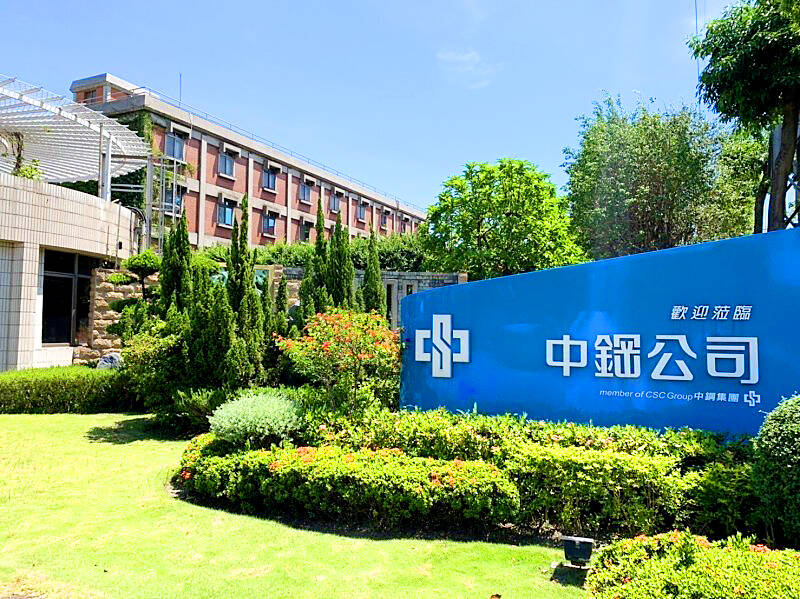China Steel Corp (CSC, 中鋼), the nation’s biggest steelmaker, yesterday hiked domestic steel prices by at least NT$500 per tonne for deliveries next month and next quarter as global steel prices rise amid a widening trade war.
Steel prices in the US have surged about 30 percent to surpass the key US$1,000 per tonne level since US President Donald Trump last month threatened to impose higher tariffs on all aluminum and steel imports, CSC said in a statement.
Trump early this month exercised his authority under Section 232 of the US Trade Expansion Act of 1962 to slap a 25 percent tariff on steel imports, citing national security concerns.

Photo courtesy of China Steel Corp
Prices in Europe are also on the rise, with the EU saying it would launch retaliatory countermeasures on US goods from April 1, CSC said.
The EU has proposed to cut duty-free hot-rolled coil safeguard quotas for major importers and to extend the coverage to include more items, it said.
“Considering the favorable market sentiment for an uptrend and the uneven impact of new US tariffs on downstream industries, CSC is hiking prices for some products and holding on others for April and second-quarter deliveries,” the statement said.
Taiwanese firms have long faced a 25 percent levy on steel exports to the US, so the new tariff scheme places local steelmakers on equal footing with foreign rivals, it added.
China’s push for structural reform and green manufacturing is helping to mitigate overcapacity in China, which also bodes well for overall market sentiment, it said.
In their latest quotes, China’s Baowu Steel Group Corp (寶武鋼鐵集), the world’s largest steelmaker, and Angang Steel Co (鞍本鋼鐵) announced they would hold prices steady for delivery next month, while Formosa Ha Tinh Steel Corp (台塑河靜鋼鐵興業) in Vietnam hiked prices by US$20 per tonne.
Under the latest price adjustments, prices of hot-rolled steel coils and plates, and cold-rolled steel coils are to rise by NT$500 per tonne for domestic deliveries next month, CSC said.
Hot-rolled plates are typically used in house and bridge building, while cold-rolled steel plates are usually used in vehicle manufacturing.
Prices of hot-rolled coils of rerolling quality would go up by NT$600 per tonne next month, CSC said.
Prices of electro-galvanized steel coils, galvanized steel coils and electrical steel coils are to remain unchanged, it said.
For the second quarter, prices of steel bars and rods are to increase by NT$600 per tonne, while hot-rolled plates and coils, as well as cold-rolled coils used in carbon steel and tool steel are to rise NT$500 per tonne, the company said.

Sweeping policy changes under US Secretary of Health and Human Services Robert F. Kennedy Jr are having a chilling effect on vaccine makers as anti-vaccine rhetoric has turned into concrete changes in inoculation schedules and recommendations, investors and executives said. The administration of US President Donald Trump has in the past year upended vaccine recommendations, with the country last month ending its longstanding guidance that all children receive inoculations against flu, hepatitis A and other diseases. The unprecedented changes have led to diminished vaccine usage, hurt the investment case for some biotechs, and created a drag that would likely dent revenues and

Global semiconductor stocks advanced yesterday, as comments by Nvidia Corp chief executive officer Jensen Huang (黃仁勳) at Davos, Switzerland, helped reinforce investor enthusiasm for artificial intelligence (AI). Samsung Electronics Co gained as much as 5 percent to an all-time high, helping drive South Korea’s benchmark KOSPI above 5,000 for the first time. That came after the Philadelphia Semiconductor Index rose more than 3 percent to a fresh record on Wednesday, with a boost from Nvidia. The gains came amid broad risk-on trade after US President Donald Trump withdrew his threat of tariffs on some European nations over backing for Greenland. Huang further

CULPRITS: Factors that affected the slip included falling global crude oil prices, wait-and-see consumer attitudes due to US tariffs and a different Lunar New Year holiday schedule Taiwan’s retail sales ended a nine-year growth streak last year, slipping 0.2 percent from a year earlier as uncertainty over US tariff policies affected demand for durable goods, data released on Friday by the Ministry of Economic Affairs showed. Last year’s retail sales totaled NT$4.84 trillion (US$153.27 billion), down about NT$9.5 billion, or 0.2 percent, from 2024. Despite the decline, the figure was still the second-highest annual sales total on record. Ministry statistics department deputy head Chen Yu-fang (陳玉芳) said sales of cars, motorcycles and related products, which accounted for 17.4 percent of total retail rales last year, fell NT$68.1 billion, or

MediaTek Inc (聯發科) shares yesterday notched their best two-day rally on record, as investors flock to the Taiwanese chip designer on excitement over its tie-up with Google. The Taipei-listed stock jumped 8.59 percent, capping a two-session surge of 19 percent and closing at a fresh all-time high of NT$1,770. That extended a two-month rally on growing awareness of MediaTek’s work on Google’s tensor processing units (TPUs), which are chips used in artificial intelligence (AI) applications. It also highlights how fund managers faced with single-stock limits on their holding of market titan Taiwan Semiconductor Manufacturing Co (TSMC, 台積電) are diversifying into other AI-related firms.